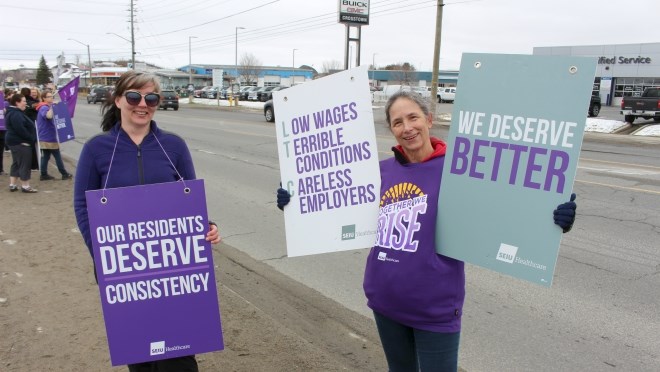Extendicare Falconbridge employees took to the streets on Thursday for an information picket, calling on their parent company to better support frontline staff.
The company made $31.7 million across all of its Extendicare locations in 2018, and frontline workers say that far too much of that money is going back into the pockets of executive staff and management, rather than bolstering frontline workers, which in turn is hurting residents.
"At one time, seven, eight years ago, we were never short on frontline staff," said Shantel Cashmore, a PSW (Personal Support Worker) and laundry aid at Extendicare Falconbridge. "Now it's a daily occurrence that we're short staffed."
The message from many PSWs who are caring for residents is that they are overworked, mentally and physically drained, and there is no support in sight.
Cashmore says that on any given day, there should be at least 10 people working directly with residents, at a 1:8 ratio, where one PSW is working directly with eight residents.
On most days at Extendicare Falconbridge, that number is closer to six people working, with a ratio of 1:14. Ontario's Long-Term Care Homes Act does not mandate a set ratio with respect to the maximum or minimum number of residents each PSW can have in their care.
Cashmore also says that, ideally, there should be four Registered Practical Nurses (RPNs) on site every day, but Extendicare Falconbridge generally operates with just two.
"The residents aren't getting that closer level of attention and care," said Cashmore. "The needs of our residents are becoming more and more complex. There are people with Alzheimers, dementia, and it's hard for staff to care for these people properly because everyone has so many people to look after."
Frontline staff help residents with everything from helping them go to the bathroom, brushing their teeth, bathing, eating, brushing their hair and more. This practice has turned from a personal level of care to more of a "herding cattle" model, Cashmore said.
Personal Support Workers earn about $5/hour above minimum wage on average, with starting wage starting at $18/hour. Stressful working conditions, stretched staff and little room for wage increases has made finding and keeping PSWs a difficult task for many long-term care homes, including Extendicare Falconbridge.
"You look around at these people who are picketing today, most of these workers have been here for 20 or more years -- it's tough for us to bring in new people," said Cashmore. "We've had people start and within a month they quit."
Service Employees International Union (SEIU) represent Extendicare Falconbridge's employees, and union rep Jody Etmanski says too much of the funding for long-term care homes is being doled out among upper management.
"More funding needs to be going to frontline staff," said Etmanski. "The bottom line is, this is creating a rushed care system where frontline workers are overworked, which puts their health at risk and impacts the quality of care they can deliver."
While bed spaces at long-term care homes has been a longstanding issue in the province, Cashmore and Etmanski both says that with a for-profit organization like Extendicare, they're never turning away new residents.
"That's money for them, they'll keep taking people in because that's more profit," said Etmanski. "It's not that the government isn't giving funding to Extendicare, it's just going to management rather than frontline staff."
Etmanski says that even when more money opens up in the budget, through attrition, there's little to no room to move up through the company if you're working on the frontlines.
"They add management positions, but it's usually people who are hired from the outside," said Etmanski.
Frontline staff are generally coming in half an hour early and leaving half an hour late -- an hour for which they aren't compensated, and many are working through their breaks.
"It's hard, it's mentally and physically draining and it's not fair to our residents," said Cashmore. "These are human beings, they deserve that care and they deserve respect."
